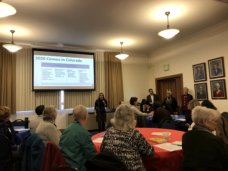
Minority and civil rights activists applauded Tuesday's court decision overruling the Trump administration's plan to include a question regarding citizenship status on the 2020 Census.
But in Denver's Park Hill neighborhood, where several groups hosted an informational meeting about the Census, there was no celebration.
Community members still worry that the question, "Is this person a citizen of the United States?" will show up on the Census, despite the court ruling.
And even if the question is excluded, many worry that immigrant households will still avoid filling out the Census form, fearing police scrutiny or deportation. Uncounted households skew Census data, and that can have negative long-term effects on communities, including under-representation in legislatures and Congress and disproportionately small shares of tax revenues and government benefits.
The legal battle over the citizenship question has intensified existing insecurity among both mixed-status and undocumented communities.
"A lot of the damage is already done," said Gillian Winbourn, project director for Together We Count Colorado.
Francisco Hernandez, a student at Metropolitan State University and a DACA recipient, said that distrust of the government goes far beyond the Census. "[The immigrant community is] very skeptical and very afraid, with the current climate. It discourages them from getting involved with government officials. They're afraid that their information might be handed over to ICE," he said.
However, Hernandez pointed out, the citizenship question may make people even more fearful of the Census. "If the [citizenship] question is on the form, then I'm not sure if my mom will share her information."
Tuesday's event, hosted by The League of Women Voters, Colorado Common Cause, Together We Count, and Mi Familia Vota, informed attendees about the importance of ensuring that all communities are fully counted by the Census. Patrick Potyondy, policy manager for Colorado Common Cause, outlined five key areas that Census data affects: how many seats each state receives in the House of Representatives, legislative and congressional redistricting, the allocation of federal funds to states, legislative decision-making, and civil rights enforcement. "Unless we have really good data, we can't make good decisions," he said.
Potyondy explained that if the citizenship question is included in the Census, "It will discourage people from answering, and it's particularly discouraging for immigrant communities and refugee communities. It [will have] a really broad impact. If you have one individual whose legal status might be unknown, then that whole household you're trying to count may not answer [the Census,]" he said.
The issue made headlines Tuesday morning when a federal judge in Manhattan blocked the Commerce Department, which oversees the Census Bureau, from adding the citizenship question. Wilbur Ross, the Commerce Department secretary, previously stated that the question was added at the request of Justice Department to aid enforcement of the Voting Rights Act, which prohibits racial discrimination in voting. In the past, the Justice Department has used data from the American Community Survey, which does inquire into citizenship status, for this purpose.
However, the Justice Department did not formulate citizenship question on its own. Ross began considering adding citizenship question soon after he became Commerce secretary, and met with other government officials to inquire "whether the Department of Justice would support, and if so would request, inclusion of a citizenship question," according to a memo Ross wrote on June 21.
Mi Familia Vota, a national civic engagement organization, released a statement Tuesday: "Today's ruling indicates that the Trump administration's decision to add a citizenship question to the 2020 census was unlawful and egregious. The administration has been clear in its attempt to defund Latino community resources and strip us of our political power. It's time to end the attacks against our community. The Trump administration must accept this ruling and allow the 2020 census to be implemented without the citizenship question."
Together We Count Colorado, an organization that seeks to ensure a complete population count in the 2020 Census, is preparing for the citizenship question to be included on the census form. "It's unresolved, and everybody expects it to go to the Supreme Court," said Rosemary Rodriguez of Together We Count.
The organization is planning to train community members on how to communicate the aims and impacts of the Census to others. "The primary thing is to provide education so that the household gets a Census form, and then they can make an informed decision. We want them to have the background and the education to make an informed choice," said Rodriguez.
"Obviously, it's better for the community if they fill out the form because of those funding issues, because of political representation, but it's got to be a personal decision that they make for their household."
No comments:
Post a Comment